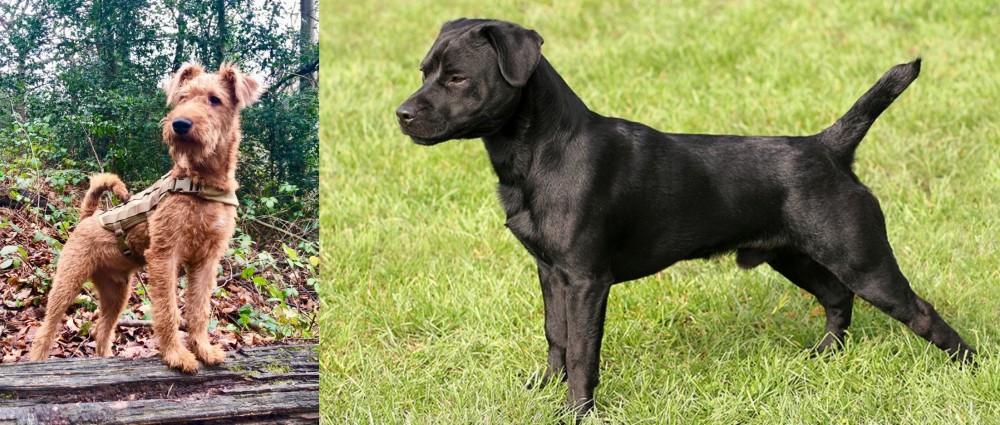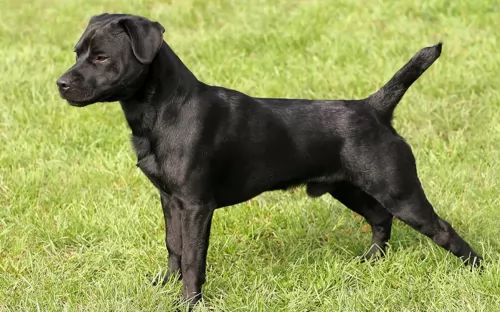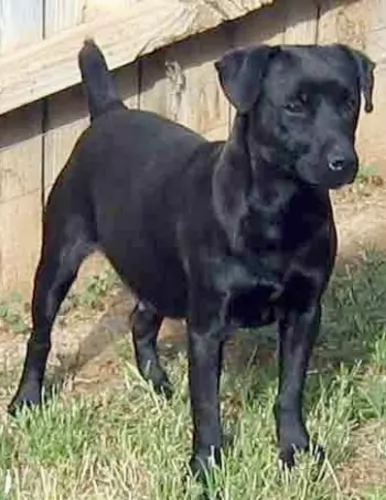 Petzlover
Petzlover Irish Terrier is originated from Ireland but Patterdale Terrier is originated from United Kingdom. Irish Terrier may grow 10 cm / 4 inches higher than Patterdale Terrier. Both Irish Terrier and Patterdale Terrier are having almost same weight. Both Irish Terrier and Patterdale Terrier has almost same life span. Both Irish Terrier and Patterdale Terrier has almost same litter size. Irish Terrier requires Moderate Maintenance. But Patterdale Terrier requires Low Maintenance
Irish Terrier is originated from Ireland but Patterdale Terrier is originated from United Kingdom. Irish Terrier may grow 10 cm / 4 inches higher than Patterdale Terrier. Both Irish Terrier and Patterdale Terrier are having almost same weight. Both Irish Terrier and Patterdale Terrier has almost same life span. Both Irish Terrier and Patterdale Terrier has almost same litter size. Irish Terrier requires Moderate Maintenance. But Patterdale Terrier requires Low Maintenance
 The Irish Terrier is a dog breed from Ireland and one of the many different terrier breeds there are.
The Irish Terrier is a dog breed from Ireland and one of the many different terrier breeds there are.
Nobody is too sure of the Irish Terrier's history but it is one of the oldest terrier breeds. It appears as if the dog breed was developed from a wheat colored terrier and the extinct black and tan terrier.
It was always a common practice to crop the ears of terriers, but in 1889 the Irish Terrier Club required that the ears remain uncropped. The first Irish Terrier was shown in 1881, and the first Irish Terrier registered with the American Kennel Club was in 1885. The Irish Terrier Club of America was founded in 1896.
 The Patterdale was developed in England,with his origins being linked to an early breeder with the name Joe Bowman.
The Patterdale was developed in England,with his origins being linked to an early breeder with the name Joe Bowman.
They were sought after for their prowess at guarding sheep from foxes. The dog was recognized by the United Kennel Club in 1995. It is believed the dog is descended from the Northern terrier breeds and can be traced far back.
 The Irish Terrier is a medium sized dog who stands between 45cm and 50cm and weighs in the region of 11 to 12kg. He has a short, dense, wiry double coat which is a red, golden, sandy, wheaten color.
The Irish Terrier is a medium sized dog who stands between 45cm and 50cm and weighs in the region of 11 to 12kg. He has a short, dense, wiry double coat which is a red, golden, sandy, wheaten color.
The ears of the dog are semi-erect/semi-floppy and the tail is held high and curved.The chest is deep and muscular and the front and back legs are strong, long and muscular.
The Irish Terrier is a companion dog today, even though he was once a guard- and hunting dog. He is an amicable dog while also being alert and active. He is also independent and strong-willed so he will require training and socialization as then he becomes obedient and relaxed and much easier to live with.
They're social dogs too, loving all the members of their human family, getting on well with children in the home.
 The Patterdale Terrier is a small sized dog that stands at between 25 and 40 cm in height and weighs 5 to 7kg.
The Patterdale Terrier is a small sized dog that stands at between 25 and 40 cm in height and weighs 5 to 7kg.
The coat of the dog can be smooth, broken or rough, but all coats are double and weatherproof. Colors include red, liver, black, bronze, black and tan or chocolate and sometimes brindle. The ears are floppy and medium length and the tail is also medium length and held high, curving slightly. It used to be docked and then ¼ to 1/3 of the tail was removed.
The Patterdale Terrier is small but he is bold and confident and very energetic. He will certainly need to be in a household where the family members are active, busy people. Because he is strong-willed he will benefit from training and socialization which will make him obedient and able to behave well in different situations.
 Irish Terriers are good with people and want to be an active member of their human families.
Irish Terriers are good with people and want to be an active member of their human families.
They are active dogs and will require ongoing mental and physical stimulation. This is a lively dog, but he still loves to spend quiet time indoors with his family.
They’re intelligent dogs with a strong sense of loyalty towards their owner, making excellent family pets.
 Intelligent, courageous and feisty, the Patterdale Terrier is a dog that will get on well with everyone in the house. Those who are active and outdoor types will be the best kind of dog owners for this active, energetic dog.
Intelligent, courageous and feisty, the Patterdale Terrier is a dog that will get on well with everyone in the house. Those who are active and outdoor types will be the best kind of dog owners for this active, energetic dog.
The Patterdale is confident and strong willed and will do superbly well with some training and socialization. With lots of love and care, your Patterdale Terrier can make you an excellent family pet and companion.
 The Irish Terrier is a healthy dog breed and you won't find yourself running to the vet often with him, but still he can land up with one of the common dog problems.
The Irish Terrier is a healthy dog breed and you won't find yourself running to the vet often with him, but still he can land up with one of the common dog problems.
It is always wise to be aware of hip dysplasia as this is a disease which can occur in all dog breeds and all dog ages. Also look out for eye diseases such as progressive retinal atrophy and cataracts as these can lead to blindness in your pet.
There is a disease known as cystinuria which is quite a concern with Irish Terriers. It’s an inherited kidney disease where increased amounts of arginine, lysine, amino acids cystine and ornithine are excreted in the urine.
In well-functioning kidneys, blood is filtered so as to create urine. Cystine is reabsorbed back into the bloodstream but with dogs affected with cystinuria they cannot reabsorb cystine back in their bloodstream, causing an accumulation in the urine. Dogs with cystinuria suffer inflammation of the urinary tract and can also develop urinary blockage and kidney failure. Immediate veterinary intervention is required.
 The good news is that terriers have few health problems and they can live to a ripe age. Just like other dogs, they can also battle with some of the common dog ailments there are.
The good news is that terriers have few health problems and they can live to a ripe age. Just like other dogs, they can also battle with some of the common dog ailments there are.
Most allergens are foods, medicines or insects and exposure to the allergen can cause an over-reaction. In a dog, the most common symptom associated with allergies is itching of the skin. It can drive your pet mad as he licks and bites his skin. The symptoms of allergies can involve the respiratory system and he will have coughing and sneezing or even a discharge from the eyes.
Your Patterdales can also develop cataracts and glaucoma – two kinds of eye diseases. Glaucoma can unfortunately lead to blindness but something can be done if you recognize the signs. There are 2 main types of canine glaucoma, characterized by pressure inside the eye which can do damage to the retina and optic nerve – primary- and secondary glaucoma. Your vet will try to determine whether your pet has primary or secondary glaucoma to determine treatment.
 The coat of the Irish Terrier requires a brush twice a week to keep it bright. If you intend showing your dog, the coat will need to be stripped a couple of times a year to maintain the texture and color.
The coat of the Irish Terrier requires a brush twice a week to keep it bright. If you intend showing your dog, the coat will need to be stripped a couple of times a year to maintain the texture and color.
Other Irish Terrier owners take their dog to the groomers to have the coat clipped. The dog doesn't shed a lot and they are referred to as being somewhat hypoallergenic.
As with any other dog breed, other grooming needs with your Irish Terrier will include clipping the nails, checking his teeth for plaque build-up and checking inside the ears for infection.
If you're unsure how to perform these grooming procedures with your pet, simply ask your vet who will explain to you precisely how to ensure your dog remains in tip top condition.
He's a fairly active dog so you want to make sure that you are attending to his exercise needs. Take him for a walk every day, and if you've got a good sized garden, throw a ball for him. If you're a jogger you can count him in.
What you feed your Irish Terrier will depend a lot on his age and his activity levels. Every dog is a unique individual and nothing is set in stone regarding their diets. Just like people though, feeding him a lot of junk food will contribute to illness and shorten his lifespan.
He needs quality food. If you buy commercially manufactured food, make sure to read up on how much to feed him. Try and mix in some cooked chicken, brown rice and vegetables from time to time as well as some raw meat.
Learn to know what foods are toxic for him. Make sure he has a bowl of fresh, cool water constantly available to him.
 Your Patterdale Terrier has a lot of energy, so as a responsible dog owner, you will need to see that he is exercised properly. This will include a walk every day as well as spending time throwing balls or a frisbee for him. He is a working breed and has been used to being mentally and physically stimulated.
Your Patterdale Terrier has a lot of energy, so as a responsible dog owner, you will need to see that he is exercised properly. This will include a walk every day as well as spending time throwing balls or a frisbee for him. He is a working breed and has been used to being mentally and physically stimulated.
The Patterdale Terrier isn’t a high maintenance dog and his coat will simply require a brush twice a week. Your pet can’t tell you about any pain he is experiencing so you will need to watch his body language.
Dogs can easily pick up an ear infection and this can be very painful. When you brush your pet, check inside his ears for signs of redness and discharge and check inside his mouth to see if you can spot any rotten teeth. Bad teeth can wreak havoc on his health. Keep the nails trimmed.
If you intend feeding your pet commercially manufactured food, good and well because it is a convenient way to feed your pet, but make sure its a quality food. This will ensure your dog is getting in the right amount of vitamins and minerals.
To vary his diet just a bit, provide him with some home-made food such as boiled chicken, brown rice or pasta, and some wholesome vegetables such as carrots, spinach and sweet potato. Dogs love the simplicity and nutritional value of food like this, and they don't have to worry about getting a stomach ache from strange foods. Try and include some raw meat into the kibble from time to time as well.
Never leave your Paatterdale Terrier without a constant supply of fresh cool water.